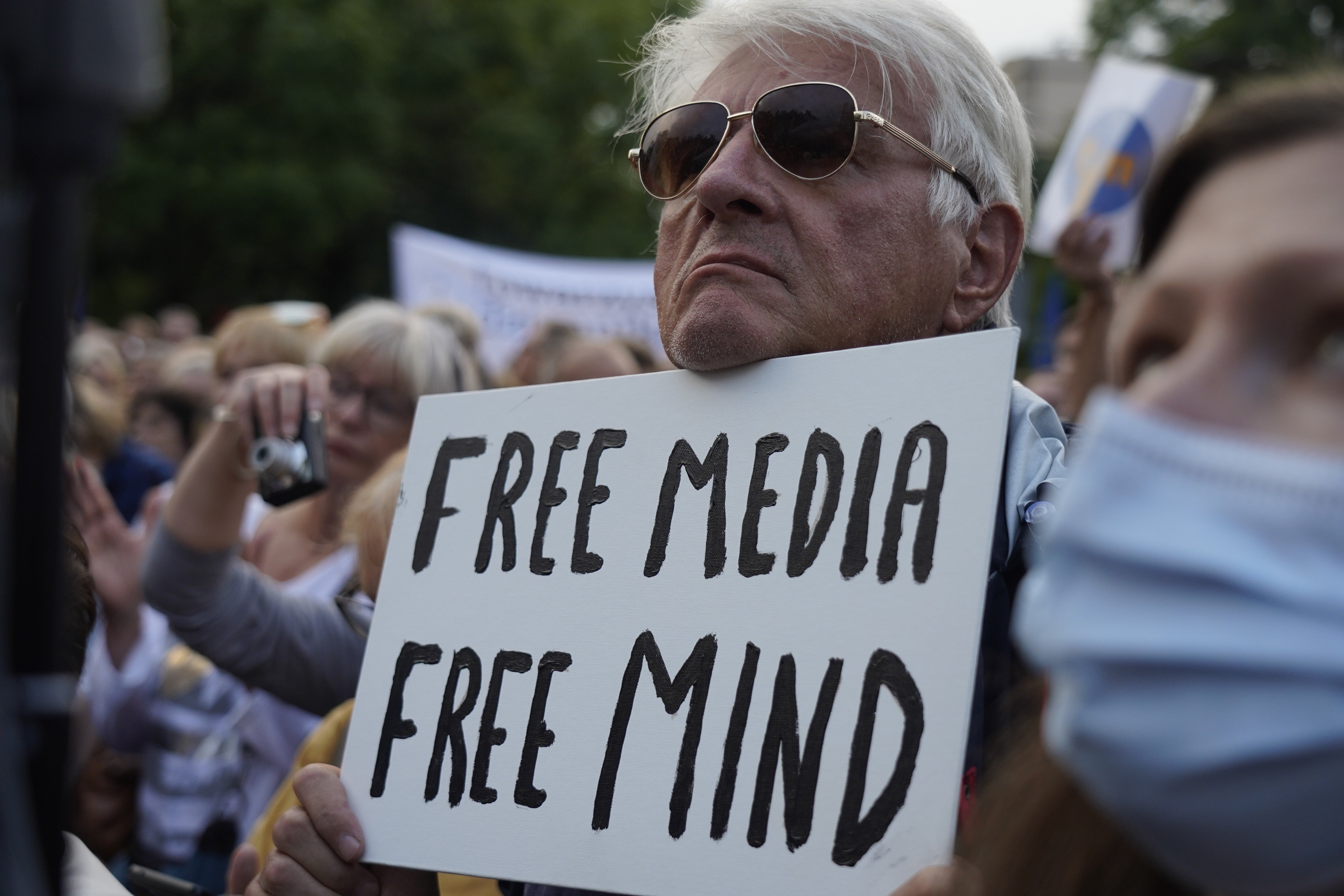Poland’s government wins battle over controversial media law exposing deep rifts
The divisive media law heightens fears for the future of freedom of speech in the country

The Polish parliament descended into chaos on Wednesday as a controversial new law was passed limiting foreign ownership of Polish media companies.
A key vote on a media law threatening the future of government-critical broadcaster TVN appeared to have been scuppered by a motion to delay the vote until early September, which won by two votes in the early evening.
But, to the outrage of opposition MPs, the speaker of the house decided to re-run the vote on delaying the session, arguing the length of the delay hadn’t been made clear.
At the same time, three MPs from the populist centre-right Kukiz’15 party claimed they had voted for the delay by mistake the first time around.
The second motion to delay the vote was then narrowly rejected – leading to cries of “shame” and “treason” from opposition politicians. The vote on the media law itself later passed by 12 votes, with ten abstentions.
The fractious nature of the session deepened public anger over a law that is being seen as an attempt to undermine press freedom in Poland.
“This media law is a way for the government to gain more propaganda power by killing off a powerful opposition voice,” Piotr Buras, head of the Warsaw office of the European Council for Foreign Relations, told The Independent.
“PiS would not have put the law to a vote if they had not been certain of winning. But it was still a very risky bet for the party,” he added.
Law and Justice (PiS), by far the largest party in the ruling coalition, had earlier been left scrambling to shore up support following the departure of the Agreement party from the coalition.
13 Agreement MPs left following the dismissal of the party’s leader, Jaroslaw Gowin, as deputy prime minister and minister of development, labour and technology
Gowin said his dismissal was the result of his opposition to the new media law, which was the subject of nationwide protests on Tuesday evening.
“There is something symbolic in the fact that my dismissal was announced simultaneously with the beginning of protests against the law throughout the country,” the Agreement leader said.
Agreement had asked the government to consider allowing member states of the OECD international economic grouping to own majority shares in Polish media companies.
With the future of the popular broadcaster TVN, owned by American company Discovery Inc., in danger due to the new law, Agreement’s proposal would have allowed continued investment from US companies. But PiS dismissed this solution as “ridiculous.”
It is feared that the new media law threatens to permanently damage Poland’s relations with Washington – while opposition politicians have described it as “gagging” freedom of debate.
After the law passed late on Wednesday, US secretary of state Antony Blinken said the Biden administration is “deeply troubled” about the Polish legislation, which “targets the most-watched independent news station, which is also one of the largest US investments in the country.”
TVN management, meanwhile, responded by saying the law “is an unprecedented attack on freedom of speech and the independence of the media” in Poland.
With the vote billed as a crucial test of the government’s ability to rule following the departure of Agreement from the coalition, PiS politicians were left stunned when opposition MPs seemed to have defeated them through the vote to delay the session.
“If this law had failed to pass, it would have meant trouble for the government,” Buras said.
“But MPs who voted for the law can be considered reliable partners for the future - and in passing the law, the government has shown it has the ability to go on,” he added.
Failure in Wednesday’s session would have been calamitous given the need to prove that the departure of Agreement would not affect the government’s legislative agenda.
Claims of corruption were rife after the re-vote on delaying the session. 2020 presidential candidate Szymon Hołownia said on Twitter that the speaker of the house and PiS had committed a “coup d’etat”, which “turned Polish parliamentarianism into a political cesspool.”
Meanwhile, furious protests erupted outside the Sejm, the parliament office, in Warsaw and in cities throughout the country.
The extraordinary events seemed to bring to end speculation about the future of the PiS government, suggesting that, by hook or by crook, it will continue to press ahead in implementing controversial reforms.
“The government will survive somehow; the media law was a very important test of this,” Buras said.
“It has been yet another way for PiS to polarise debate in Poland, something on which the party always thrives.”
Wednesday’s events underscored the polarised nature of Polish politics. PiS’s eventual success means the party is likely to press ahead with the divisive strategy that has brought it success until now.
The media law is abhorred by the Polish opposition as well as allies within the EU and across the Atlantic, but PiS have made it a top policy priority which they see as key to the survival of the current government. Wednesday night’s dramatic events have heightened fears for the future of freedom of speech in the country.
Join our commenting forum
Join thought-provoking conversations, follow other Independent readers and see their replies
Comments
Bookmark popover
Removed from bookmarks